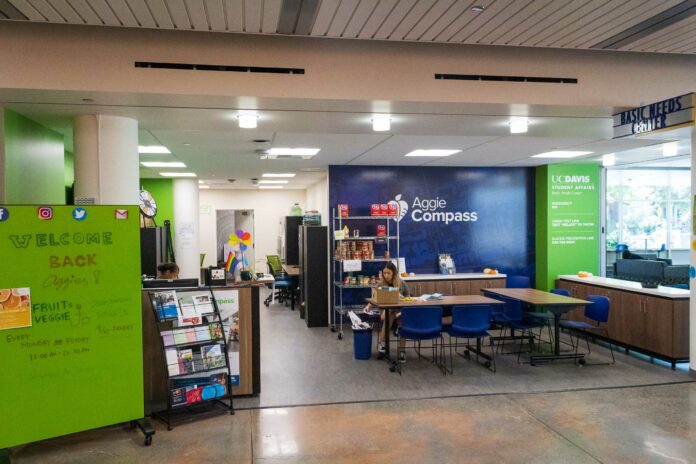UC secures $3.5 million to address homelessness, basic needs among students
New funds have been secured to provide UC students with access to rapid rehousing grants. The aid, in the form of grants and resources, aims to address students in immediate crisis as well as those at risk of homelessness.
This past July, California Governor Gavin Newsom’s new state budget allotted $3.5 million for rapid rehousing grants to be distributed across the 10 UC campuses.
Funds are projected to be transferred to UC campuses in November. Until then, UC Davis’ Aggie Compass Basic Needs Center is in the process of utilizing existing funds to provide aid to students facing homelessness or who are in imminent danger of losing their housing.
With funding provided by UC’s Mortgage Origination Program (MOP), Director of Aggie Compass Leslie Kemp has begun implementing strategies from the rapid rehousing model, which works to get students back into housing as soon as possible, to prepare the center for November.
Following the rapid rehousing model, Aggie Compass is leading the vanguard to help identify students in need, provide immediate assistance in terms of short-term housing and sometimes ensure access to food, while also connecting students with resources going forward.
Aggie Compass faces the dual issue of providing assistance to students in immediate crisis, while also working to provide resources for students that help them secure longer-term housing.
“It’s not all grants,” Kemp said. “What we’re looking for is immediate help for students in immediate crisis — both food and housing crisis — and then also once we get those students out of crisis, then we have a large amount of students at UC Davis who we would say are at risk. We want to keep them from falling into the crisis category, and that’s where food programs come in — all these programs that are both education and immediate resources.”
Today, homelessness among students often takes nontraditional forms including couch surfing, living in one’s car and intermittent homelessness.
In addition to grants that will now benefit students, Aggie Compass has hired a professional staff member in order to help students navigate the rapid rehousing process.
At UC Davis, the exact number of students currently experiencing homelessness or in imminent danger of homelessness is unclear. Within the last few years, Aggie Compass is aware of around 200 students who have experienced homelessness at some point, according to Kemp. Estimating the number of homeless students today remains an issue that the center hopes to gain more insight on moving forward.
Partnering with the City of Davis, Aggie Compass plans to engage in more outreach efforts to identify students currently experiencing homelessness.
In 2018, around 250,000 students experienced homelessness in California, according to a report published by the United States Interagency Council on Homelessness. This figure far exceeds those of any other state, with New York having the second highest rate with around 150,000 homeless students.
As leasing companies and landlords raise rent prices in Davis, and as the UC considers tuition hikes every year, many UC Davis students are classified as either housing insecure or at risk of homelessness.
Alexis Ramirez, a former ASUCD Senator and recent UC Davis graduate, previously served as the adopted senator of Housing Advising for Undergraduate Students (HAUS). Ramirez acknowledged the increasing financial pressures college students face.
“Whether it be textbooks or tuition, these costs have only exponentially risen, especially when measured next to current wages,” Ramirez said. “It should be a priority to reverse this. This can come in many forms: lowering tuition, offering more financial aid and ensuring that school administrators are not co-opted by publishing companies.”
Students spend $2,000 on non-tuition costs, including food and housing every month, according to research from the 2018-19 Student Expenses and Resource Survey conducted by the California Student Aid Commission. Of students sampled, 35% said they experience very low food security and 33% are housing insecure.
Executive Director of the California Student Aid Commission Marlene Garcia commented on the study’s findings.
“We at the Commission are listening to students,” Garcia said in the report. “We cannot ignore study after study, including our own, showing that something has to change so that we can help all California students succeed.”
Written by: Ally Russell — campus@theaggie.org




